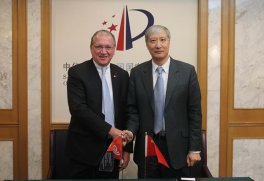
 EPO President Benoît Battistelli and SIPO Commissioner Tian Lipu (even the red flags match). Credit: EPO Web site.
EPO President Benoît Battistelli and SIPO Commissioner Tian Lipu (even the red flags match). Credit: EPO Web site.
THE EPO has not been doing a good job preserving its reputation when it let software patents slip in (from the back door) and later, based on a leaked document, started treating patent applications in a discriminatory fashion and an embarrassing manner. "There is nothing in the EPC which allows the EPO to handle applications differently," wrote this person earlier today.
C ould it be I'm getting pendantic? O r is granting patents so romantic? O ver embellishment of the statistics K nown now for years by realistics E xternal audit,lay the books bare D oes this AC really care?
Please forgive me if my post is a bit off topic. I have to tell it.
I'm one of the few "fossiles" left in The Hague. Those who started more than 30 years ago, performing searches through mountains of paper and providing both the colleagues in München and our applicants with prior art indicating the novelty destroying "X" documents and the position of the competitors.
Then came BEST, with its holy 14% productivity increase, together with the non-written rule: "Find anything against claim 1, and don't waste your time looking for the other claims." What was passed over is that following this dirty search many applicants were able to restore novelty after the first communication. And so, a new search was then required. At least for those of us having a bit of professional pride left, and of course for free. Farewell state of the art. Farewell complete searches. Cut the corners and hurry up.
Thanks to ISO 9001, the quality at the EPO improved far beyond any hope. Short ago, I've had the traditional new-year meeting with my director. Here is what I learned. Quality millesime 2016 is having no search or examination files in the red list (read "delayed"), no more than 3 published patents older than 6 months awaiting to be classified, no grants from a colleague in the examining division awaiting signature since more than 2 weeks. Highly important matters, as one can imagine. But not for inventors, not for the applicants and not for all those who pay for our work. The content of the search report/search opinion/communication interests NOBODY. Copy/paste an article of the Süddeutsche and it will reach the representative unnoticed. Like a fig leaf hiding the attributes of a horny satyr, our search strategies are now made public. Useless nonsense in terms of quality as only those who want to see can see. And being blind is so convenient for an examiner eager to reach a high productivity. How many times, as chairman, have I seen the sentence "the preparation process being novel then the product is novel too". But thanks to ISO 9001 we are the champions of the world.
Gloria in excelcis Battistelli.
In my experience, ECFS has resulted in some EPO examiners becoming more and more inclined to take a superficial view of compliance with the provisions of the EPC, and to go for as many "easy wins" as possible.
The result? More patents of questionable validity and, worst of all, more patents with claims that are completely unclear. This means more (and much harder) work, and greater expense, for third parties seeking to clear the way.
This might just be acceptable if the OD was a reliable arbiter, diligently weeding out the dodgy claims that somehow made it through the coarse filter of examination. However, given the number of times that my eyebrows have been raised when reading 1st instance decisions, I don't think that the OD can be relied upon to deliver justice often enough.
This all ends up looking less like Europe of old and more like the US - with a significant percentage of dodgy patents being granted and with 3rd parties being reluctant to challenge due to the high costs and uncertainties involved. Perhaps we can live with that. However, should the management of the EPO really be the ones deciding that this is where we end up? It does not seem the most democratic way of proceeding.